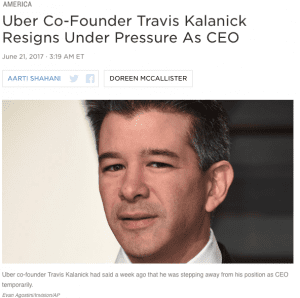
Valued at around $70 billion, Uber is one of the largest private companies in the world, but a series of serious missteps have led to the forced resignation of one of its co-founders, and a workplace culture that seemed to thrive on negative qualities.
News today that the co-founder of one of the hottest start-ups in the last decade has been forced out of his company has many experts expressing a similar sentiment: No matter how successful you are in the short-term, missteps in management can turn even a blockbuster business into a cautionary tale.
Travis Kalanick, who co-founded Uber in 2009, has been put on a leave of absence from the ride-hailing service.
The company, which has been plagued in recent months by accusations of sexual harassment and unethical business practices, simultaneously announced plans to revamp its corporate culture with new policies and procedures.
Monica Torres, writing for the website The Ladders, said there are a number of lessons any owner or manager can draw from Kalanick’s swift fall from grace at the company:
Companies need clear values — and everyone must live up to them. Your company values send implicit and explicit messages to employees every day, so make sure they accurately represent your business. “Uber had a set of values,” Torres writes. “Unfortunately, they were pretty aggressive and incentivized employees to treat each other badly in the pursuit of their own personal success. Among those values, which sound ripe for conflict: Let Builders Build; Always Be Hustlin; Meritocracy and Toe-Stepping; and Principled Confrontation.”
Listen to your employees. A female engineer at Uber complained repeatedly to management and HR about sexist treatment on the job. She was ignored. She left the company and wrote a high-profile blog post about her experience. A much better approach: Create an environment where employees are empowered and encouraged to step forward when they see wrong-doing of any kind, Torres suggests.
Don’t accept bad behavior, particularly from your leaders. As Uber’s problems began to mount, one of the company’s high-profile board members, the media mogul Arianna Huffington, suggested more women be included in the leadership, because doing so has been proven to reduce sexual harassment in workplaces. Her fellow board member David Bonderman responded with a sexist comment: “Actually what it shows is that it’s much more likely to be more talking.” When that comment became public, Uber’s problems only grew. “Creating zero-tolerance policies for harassment and discrimination is a basic human resources practice that should be easy enough to follow, and it was what the [Uber] investigation recommended,” Torres writes.










